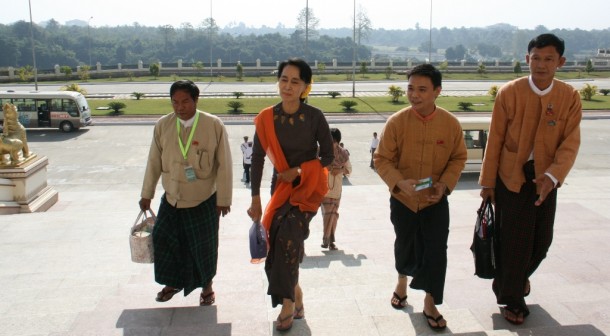Parliamentarian Aung San Suu Kyi, the head of the opposition National League for Democracy (NLD), and ethnic leaders from five parties agreed on Tuesday to work together to amend the 2008 military-backed Constitution, with the longer-term goal of creating a federal political system.
Following an hour-and-half meeting between leaders of five parties from the United Nationalities Alliance (UNA) and Suu Kyi at her home in Rangoon, the participants said amending the Constitution was key to the nation’s future.
“Daw Suu said Burma definitely needs the federal system, although she does not think it will happen immediately,” said Aye Thar Aung, the head of the Arakan League for Democracy.
“But she urged that the issue [federalism] needs to be raised over time,” Aye Thar Aung added.
Sai Nyunt Lwin, the secretary of the Shan National League for Democracy (SNLD), told The Irrawaddy just after the meeting that the group “talked about how to approach amending the Constitution, especially military participation on the issue.”
Suu Kyi told the ethnic leaders that the formation of an Evaluation Committee for Amending the Constitution has been proposed in Parliament. She added that the Constitution must be scrutinized line by line to root out inconsistencies in some of its sections.
Amending the Constitution has been at the top of the agenda for the opposition and ethnic parties since its enactment in 2008. The current Constitution offers no degree of autonomy to individual states, guarantees 25 percent of Parliament’s seats to military representatives and gives sweeping authority to the commander-in-chief of Burma’s military, known as the Tatmadaw.
The ethnic parties agreed on Tuesday to continue to push for a federal system and amendments to the Constitution before the 2015 elections. They were also united in opposition to an electoral system based on proportional representation (PR).
The country currently uses what is known as the first-past-the-post (FPTP) voting system.
Some smaller political parties have suggested implementing a PR system for the 2015 elections, which they say would allow them greater representation in Parliament. The ruling Union Solidarity and Development Party (USDP) has said it too would support a change to the PR system.
PR has been rejected by the NLD, however, with the party arguing that such a system is too complicated and ill-suited to Burma’s young democracy.
Aye Thar Aung sided with the NLD’s stance on Tuesday.
“The change in Burma now must be a transition from dictatorship to democracy. I think we do not need to change to a new electoral system.”
“We do not think the PR system is intended to make the [needed] changes for the country,” echoed Sai Nyunt Lwin. “Daw Suu also does not think it is an honest plan.”
The five parties represented at the meeting on Tuesday were once members of the Committee Representing the People’s Parliament (CRPP), formed after the 1990 election. Khun Htun Oo of the SNLD, Pu Cin Sian Thang from the Zomi National Congress, Aye Thar Aung from the ALD, Nai Ngwe Thein from the Mon Democracy Party and Saw Harry from Karen National Congress for Democracy, were present at Tuesday’s gathering.
The leaders agreed to meet frequently in the future.

















